|
|
|
Sort Order |
|
|
|
Items / Page
|
|
|
|
|
|
|
| Srl | Item |
| 1 |
ID:
144333
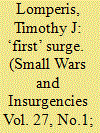

|
|
|
|
|
| Summary/Abstract |
In a military intervention, do surges work? I compare the failed ‘surge’ in Vietnam, the repulse of the Easter Invasion in 1972, as a means of assessing the more ambiguous surges in Iraq and Afghanistan. I identify four features of a surge for this analysis: the military dimensions and strategy of the surging forces, the military capabilities of the host forces, the political vitality and will of the host country, and the political commitment in the domestic politics of the intervener. I find that the last feature is the most critical; and, in all three surges, the American political commitment was lacking.
|
|
|
|
|
|
|
|
|
|
|
|
|
|
|
|
| 2 |
ID:
144327
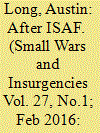

|
|
|
|
|
| Summary/Abstract |
The conclusion of the International Security Assistance Force (ISAF) mission in Afghanistan at the end of 2014 has generated substantial uncertainty about the duration and level of international commitment to Afghanistan. The fate of local allies of international forces is therefore deeply in doubt. This article is of necessity speculative rather than empirical, but it attempts to draw on the history of previous intervention in Afghanistan as well as more general patterns of local and external alliance to sketch plausible scenarios for the fate of local allies. It proceeds in four parts. First, it draws distinctions between different types of local allies in Afghanistan based on position and relationship to the Afghan state and an external actor. Second, it examines the Soviet withdrawal from Afghanistan for relevant lessons for the fate of local allies. Third, it presents a scenario based on the foregoing that assumes there will be an ongoing small but significant international military presence and accompanying resources. Fourth, it presents a scenario that assumes there will be no or minimal international military presence and accompanying resources.
|
|
|
|
|
|
|
|
|
|
|
|
|
|
|
|
| 3 |
ID:
144335
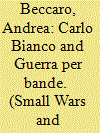

|
|
|
|
|
| Summary/Abstract |
Since the end of the Cold War, a huge debate over how war has been changing has emerged; a common feature is that modern conflicts are not state vs. state wars, but ‘irregular wars’. In order to better understand modern irregular warfare, it is important to analyse past authors and ideas. Carlo Bianco’s concept of Guerra per bande highlights elements of mobility with different cooperating units, of terror, and of complex terrain. The present study offers the first English analysis of Carlo Bianco and underlines the similarities of his work to the hybrid warfare concept.
|
|
|
|
|
|
|
|
|
|
|
|
|
|
|
|
| 4 |
ID:
144328
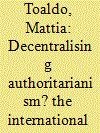

|
|
|
|
|
| Summary/Abstract |
In 2011, Libya became the only country of the Arab Uprisings where NATO and the Arab League intervened militarily, ostensibly to protect the civilian population, but in reality in support of the opposition National Transitional Council. This article argues that, since 2011, Libya has transitioned from Qadhafi’s centralised authoritarianism to a new decentralised authoritarianism where multiple centres of power coexist and sometimes overlap, while leaving room only for formal democratic institutions. This is the result of decisions taken by the ‘revolutionaries’ after the overthrow of the dictator, and a consequence of long-standing features of the Libyan state and society.
|
|
|
|
|
|
|
|
|
|
|
|
|
|
|
|
| 5 |
ID:
144326
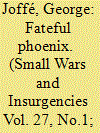

|
|
|
|
|
| Summary/Abstract |
Although the Islamic State in Iraq and al-Sham (ISIS) is seen as a novel manifestation of Islamic extremism, it is in fact the latest, albeit perhaps the most effective, of a long line of revivalist movements in the Islamic and the Arab worlds. Its motivations – hisba and jihad – differ little from its predecessors and its ambitions – to create a state organised in accordance with the precepts of the Islamic caliphate – reflect a long-standing Islamic ambition. It differs, of course, in terms of the sophistication of its political and military strategies, which mirror the contemporary complexities of the world in which it operates, but its objectives recall long-standing Islamic ideals, even if articulated in radically brutal and extremist ways. More importantly, perhaps, ISIS or Da’ish, to give it its Arabic sobriquet, reflects the enormous degree of resentment inside the Middle East at the ways in which Western powers have intervened in regional affairs over recent years, particularly their support for regimes and economic systems there that have betrayed, in the popular imaginary, the essential principles of social justice that lie at the root of Islamic vision of ideal social order. Indeed, in many respects, its analysis of the world in which it operates and of the objectives it seeks differ little in essence from those any other resistance and rejectionist movement, whether religious or sectarian. More specifically, it has been the sectarian conflict that resulted from the reversal of political order in Iraq as a result of the 2003 American-led invasion that has driven the success of the movement in capturing widespread Sunni support. Whether it can manage the complexities of the administration of a state remains open to question.
|
|
|
|
|
|
|
|
|
|
|
|
|
|
|
|
| 6 |
ID:
144330
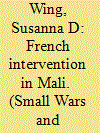

|
|
|
|
|
| Summary/Abstract |
The March 2012 coup in Mali opened the door to expanded territorial occupation in northern Mali by Tuareg separatists and subsequently armed Islamist extremists. French forces intervened at the behest of the interim government in Mali. This article examines how various actors frame the conflict to their advantage. While the Malian government and France are allies, the position of various Tuareg actors shift over time as they strategize and weigh the value of allegiance with the French. Local extremist organizations are labeled as terrorists and are targeted as enemies. This article argues that the conflict has been decontextualized and framed within the ‘war on terror’. France’s decision to intervene and to expand their regional military presence, rather than exit, is legitimized by the framing of their intervention as integral to counterterrorism efforts.
|
|
|
|
|
|
|
|
|
|
|
|
|
|
|
|
| 7 |
ID:
144331
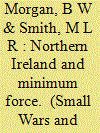

|
|
|
|
|
| Summary/Abstract |
The debate over whether there exists a British counter-insurgency tradition of minimum force is one that has been thoroughly discussed. Is there anything left to say? This study suggests there is further insight to be attained if one explicitly evaluates the concept of minimum force in relation to the conduct of the security forces in the years of the Northern Ireland conflict. Through an examination of three key periods in the conflict, it will be shown that while there was invariably an awareness of the need to act with restraint among senior officers at the strategic level, this was often difficult to apply at the tactical level in the heat of confrontation. The argument demonstrates that the British Army, and other instruments of the state, rarely acted in a manner that could be described as ‘minimal’. Instead, it was the broader liberal values of the British state that explains largely the degrees of restraint exhibited by the government and security forces.
|
|
|
|
|
|
|
|
|
|
|
|
|
|
|
|
| 8 |
ID:
144332
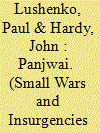

|
|
|
|
|
| Summary/Abstract |
The US Army has two approaches to counterinsurgency operations in Afghanistan. One is hard, or combat-focused, and the other is soft, or development-focused. This study examines two US Army task forces deployed to Panjwai District, Afghanistan from 2012 to 2013. CTF 4-9 and 1-38 offer a meaningful comparison because they pursued these contrasting approaches among the same population and against the same enemy at the same time and place. The study compares each unit’s approach and finds that neither approach was successful absent the other. The article concludes by recommending further research into combining the approaches at the operational level.
|
|
|
|
|
|
|
|
|
|
|
|
|
|
|
|
|
|
|
|
|